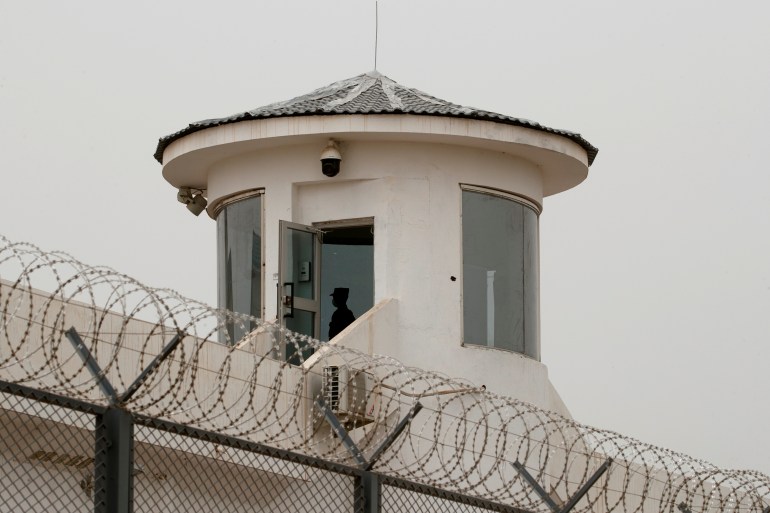[ad_1]
Taipei, Taiwan – Top carmakers, like Standard Motors, Toyota, Volkswagen, Tesla and BYD are at a superior possibility of employing aluminium developed by compelled labour in China’s Xinjiang province, a report by Human Rights Check out (HRW) has uncovered.
China is the world’s biggest automobile producer as very well as the most significant producer of aluminium, which is applied in tyres, windshield wipers, electrical vehicle (EV) batteries and other automotive areas.
As a lot as a person-fifth of China’s aluminium is developed by smelters in Xinjiang, where human legal rights groups imagine far more than 1 million ethnic minority Muslims have been subjected to internment and other abuses which include pressured labour and compelled sterilisation.
HRW reported in its report that carmakers are executing minimal to keep track of their supply chains in China, and, in some cases, have succumbed to Chinese authorities stress to utilize weaker sourcing specifications at their Chinese joint ventures than in their world functions.
“Most corporations have performed way too little to map their offer chains for aluminium components and establish and handle likely links to Xinjiang,” the legal rights team stated in its 99-page report released on Thursday.
“Confronted with an opaque aluminium field and the risk of Chinese federal government reprisals for investigating one-way links to Xinjiang, carmakers in numerous circumstances continue to be unaware of the extent of their exposure to forced labour. Shoppers ought to as a end result have small self-confidence that they are acquiring and driving autos totally free from hyperlinks to abuses in Xinjiang.”
China has been accused of carrying out an aggressive programme of compelled assimilation against Uighurs and other ethnic minority Muslims for additional than a 10 years, foremost to the internment of additional than a million folks in what Beijing has described as “vocational teaching centres”.
China has denied committing human rights violations in the region and insisted its programmes focusing on ethnic minority Muslims have lowered radicalisation and terrorism.

In its report, HRW reported “credible evidence”, together with Chinese point out media article content, enterprise stories and authorities statements, signifies that aluminium producers in Xinjiang are collaborating in authorities-backed labour transfer programmes.
While countries which include the United States have banned products and solutions built in Xinjiang, materials like aluminium can be difficult to trace, the New York-centered rights team stated.
Xinjiang aluminium usually takes the sort of ingots, which can be melted down with other components to make aluminium alloy, simply concealing its provenance.
Michael Dunne, CEO of Dunne Insights and an pro on China’s automotive market, claimed that mapping supply chains in China can be an exceptionally tough task.
“Supply chains for automakers in China are somewhere on the spectrum in between exceptionally byzantine and an iron-clad black box,” Dunne instructed Al Jazeera. “It’s like counting to infinity – you could possibly make progress but you’ll by no means get there.”
HRW reported car producers should do a lot more to map their offer chains or place pressure on their joint companions in China to do the same.
HRW explained Volkswagen mentioned in response to inquiries that the carmaker has “no transparency about the supplier relationships” with its joint-undertaking partners in China.
HRW reported Common Motors, Toyota and BYD did not react to inquiries, but Standard Motors mentioned in its once-a-year report the issues of tracing their Chinese source chain.
Tesla, which does not run with a joint venture, said it had “in various cases” mapped its offer chain again to the mining degree and not uncovered proof of compelled labour but did not specify even more, in accordance to HRW.
The 5 carmakers did not respond to Al Jazeera’s requests for comment.
Duncan Jepsen, a provide chain skilled and United kingdom-educated solicitor, explained tracing offer chains is an situation of cost and will on the component of brands.
“For an NGO, it may perhaps be complicated to monitor a supply chain in China. In other sites in China, for a big, perfectly-capitalised vehicle producer with no economic sources … I assume the response is it is highly-priced, possibly. But it is not that tricky,” Jepsen explained to Al Jazeera.
“And that’s truly the crux of the challenge … It’s difficult and difficult and practically difficult if you want to expend nothing at all on it,” he additional.
China’s huge market place also gives it leverage more than carmakers.
On leading of becoming the world’s most significant car manufacturer, China is also the greatest market place for motor vehicle revenue – with 23.5 million autos bought in 2022 as opposed with 13.6 million in the US, according to HRW.
“That’s the catch-22 they’ve obtained is that it’s not a nation that they notably want to leave,” Jepsen explained.
“So if they want their market place penetration, it’s likely to be a big strategic final decision of how car producers deal with this. And it is heading to be interesting to observe.”
[ad_2]
Supply link






























